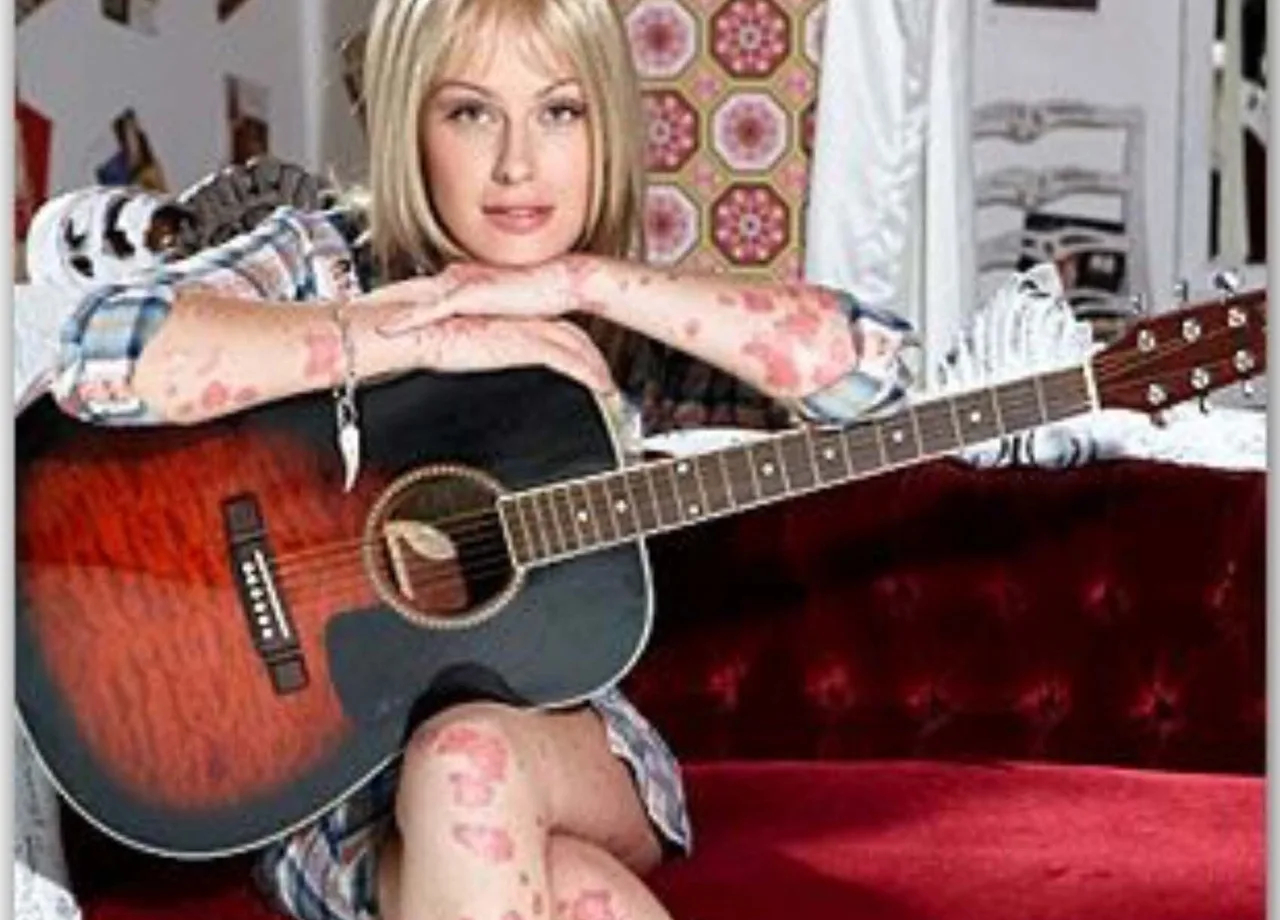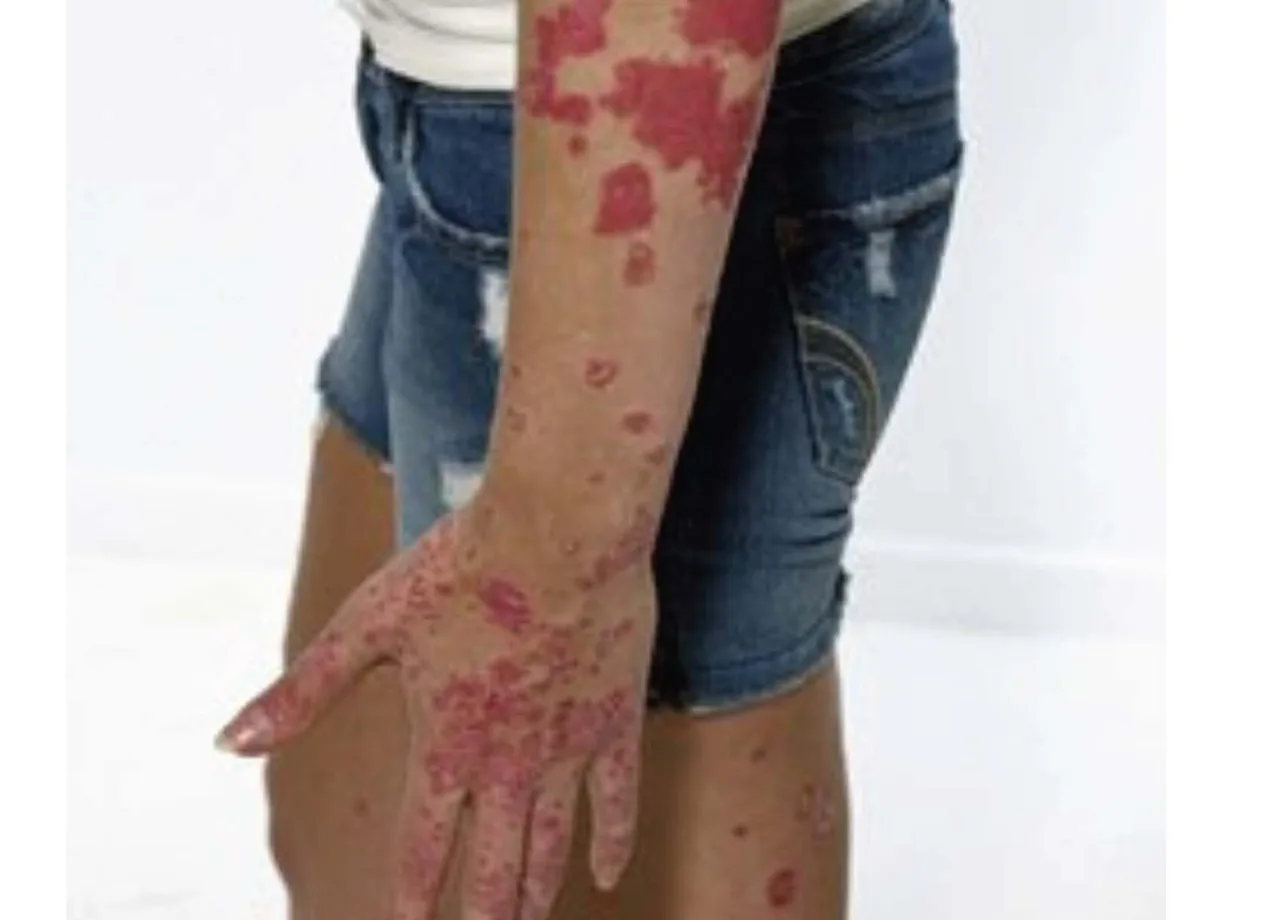Psoriasis in the spotlight: an interview with CariDee English
01 January 2019
By IFPA
Actress, model, drummer, activist: CariDee English does it all. She flew into the spotlight in 2006 when she won the world-famous reality TV competition America’s Next Top Model. Since then, CariDee has nurtured a multifaceted career, emphasizing not only her creative outlets, but also her relationship with her lifelong companion: psoriasis.
CariDee was diagnosed with psoriasis at 5 years old. She was sitting in the back of the car when she first noticed the spots on her leg. She told us, “The thing I remember most is looking at my mom when I showed her, and her face just kind of fell.” CariDee’s mother, who is living with psoriasis herself, immediately recognized the significance of those spots. She brought her daughter to a dermatologist, and they began the lifelong journey of treatments and living with psoriasis. Being so young, CariDee didn’t quite understand what lay ahead. Growing up with psoriasis, CariDee explained, “When I was so young, it didn’t really affect me. I didn’t really comprehend. But then as I grew, my psoriasis grew with me.”
CariDee’s skin reacted to the hormone changes of puberty. In one summer she grew three inches and her plaque went from covering 20% to 70% of her body.
As an adolescent, CariDee’s symptoms worsened. Her skin reacted to the hormone changes of puberty. In one summer she grew three inches and her plaque went from covering 20% to 70% of her body. She remembers the other kids treating her differently because of how her skin looked, but in her experience it was the other parents that were the real problem. In her words, “The other parents are the worst because they are like ‘What do you have? Is my kid going to catch it?’ I remember going to a pool. I would wear two or three pairs of nylons when I went to the pool. I’m sure they looked really funny on my feet, but then I could just run into the pool and people wouldn’t notice. And I remember, I got asked to leave the pool for a summer because the parents were scared that I had a communicable disease.” As these kinds of stories built up over time, CariDee began to build a dark narrative in her mind. “At that point I was so used to saying, ‘getting psoriasis is like getting the act of rejection,’” she remembered wincing with compassion for her vulnerable, adolescent self. “’Psoriasis is being rejected.’ That was my story. That’s exactly what I had burnt in my head.”
Still, despite this rejection, CariDee was determined to become a performer. She fell in love with theater at a young age. Performing and exercising her creativity in an outward way was what truly made her feel alive. Psoriasis was not going to get in the way of her voice, and her ability to bring people joy. “I look back at my young self and think, ‘God, I was so brave.’ she laughed. “I was covered in psoriasis, but I was thinking “I want to be a model!’” The people in her life encouraged her to pursue studies and to aspire to more realistic goals. But CariDee would not be deterred.
The beginnings of CariDee’s career seemed to prove her entourage right. Exciting opportunities often turned into more traumatic rejection. In an already difficult and competitive industry, CariDee’s psoriasis seemed to be yet one more hurdle to overcome. She learned to conceal her psoriasis with clothing, body makeup, and clever posing. Things started to look up when, at 17, CariDee was signed to a big modelling agency in Miami. She courageously moved her life across the country to sign a contract and start building a portfolio. “One day we went to shoot in the ocean, and the water washed off the makeup… I remember that overwhelming feeling of anxiety, like ‘Oh my god, my clothes are falling off.’ It felt like I was being exposed. Because I was. And I was really afraid because of my contract.” When the film came back showing imperfections in her skin, CariDee was forced to reveal her psoriasis to her agency. “I got another rejection, and they bought me a ticket for the next day. It was that cut and dry.”
The abrupt ending of her contract was a significant emotional, financial, and physical blow that took several years to recover from. 17-year-old CariDee moved back to North Dakota to work as a hospital janitor, a job she jokingly describes as “less glamorous than modelling.” But being a janitor afforded CariDee health insurance, and she was able to start a new psoriasis medication. After three years, CariDee’s skin was finally clear, her emotional wounds had begun to heal, and she had set her sights on the next step in her career: America’s Next Top Model.
For those of our readers who may not be familiar, America’s Next Top Model is a reality television show in which aspiring models compete for a contract. CariDee’s choice to participate was a strategic one. For one, Top Model is an extremely popular show with global distribution. “I decided that I would do top model as a way to get large exposure to make up for those years between when I got sent home from Miami and when I was 21. Three years had lapsed that I couldn’t model because my psoriasis was so bad,” she explained. There was also a second reason that CariDee wanted to compete on Top Model. She realized, “I’m going to be on television. If I tell someone that I have psoriasis, I don’t think they’re going to kick me off. They might be able to embrace me. And I’ll be able to reach other people that are sitting there with psoriasis.” If she could get onto the show, and become an important competitor for a few episodes, she might become too valuable to the show and to the public for them to kick her off. The move was a gamble, but it was one that CariDee was willing to take.
“I got embraced. I got embraced all over the world by people who heard my story, because the show runs globally…I still had one vulnerable moment in me to want to be understood and accepted, and I’m glad I said that. I think that’s the best sentence that’s ever come out of my mouth because it helped me, and it helped a lot of people after.”
In the end, it was also a risk that paid off. CariDee kept her psoriasis a secret for the first four weeks of the seventh cycle of America’s Next Top Model. She finally revealed her condition to supermodel host, Tyra Banks, and for the first time in her professional life, she was embraced. In her words, “I got embraced. I got embraced all over the world by people who heard my story, because the show runs globally…I still had one vulnerable moment in me to want to be understood and accepted, and I’m glad I said that. I think that’s the best sentence that’s ever come out of my mouth because it helped me, and it helped a lot of people after.”
That moment ended up launching CariDee’s career into high speed. She went on to win the competition, and became a successful model, actress, and musician. At the same time as her celebrity grew, CariDee also became a passionate psoriasis activist. She became a spokesperson for the National Psoriasis Foundation, and the face of a psoriasis medication. Last year she was also diagnosed with psoriatic arthritis. To this day, she continues to do walks for awareness, participate in patient forums, and travel around the world sharing her story.
CariDee’s attitude about psoriasis today is a far cry from what it was in her youth. “I frickin’ love my psoriasis today!” she gushed in our conversation. “I’m so happy I have the disease because I can speak on behalf of millions of people with this and live in the skin they live in. I’m so proud of it.” She admits that it sometimes takes effort, but CariDee doesn’t allow herself to get stuck in insecurity anymore. “Once you’ve decided you’re confident in [psoriasis], it doesn’t always stay. It’s work. Sometimes I’m walking down the street and I can feel a person coming up behind me. I have psoriasis on my elbows really thick and I find myself wanting to do the inverted arm thing, like one of my weird positions so people don’t see. And then I think, ‘No. You don’t have to hide anymore.’” CariDee wants to be a person who stands up for her psoriasis and feels confident because she wants to be an example for others to do the same. “Things aren’t going to change on their own unless we as women or men just really own ourselves. [We can do it] by standing up and saying, ‘This is who I am. It’s different. It’s beautiful. I feel vulnerable, but I feel brave today that I have psoriasis.’”
In terms of her career, this philosophy of ‘owning her psoriasis’ has also served tremendously. Where she used to feel a huge pressure to keep her psoriasis a secret, now she feels comfortable on set. As a person who is known for her psoriasis advocacy, CariDee can also use her voice to empower herself in her own work. She tells the people she works with, “You’re not going to cover this up! We’re going to keep this rolling. This is just a part of me. If people have tattoos on film, I can have my psoriasis.”
As for her advocacy work, CariDee has no shortage of passion. She has become known for her catchphrase “You have psoriasis. Don’t let psoriasis have you.” It’s a message she wants to send to the farthest reaches of the world. “I spent so many years hidden… Not living the life that is such a precious gift, letting psoriasis call the shots. Live your life, and bring your psoriasis with you! Show it a fricking good time!”
If CariDee is working hard to transmit this confident attitude and to encourage fellow psoriasis “tribe members” to find their group, it’s because she knows from personal experience what a difference community can make. Having a psoriasis community can be the difference between being a shut-in or living a full life. It can be the difference between hiding and feeling confident. It can be the difference between settling or aiming for your dreams. Every time CariDee shares her story, she is embraced with an outpouring of support from around the world. She wants to give that same support right back. “Other people have come forward, taking pictures [of their psoriasis], tagging me. It’s just incredible. Bravery! Changing the stigma! I love it! I’m so honored, so humbled, and so grateful to be in a position to speak out about it.”
CariDee’s journey with psoriasis isn’t over. She continues to reach out to people who have psoriasis, in organized settings like patient forums, or even just in passing in the street. Her next objective is to write a book cataloguing her experience with psoriasis as well as the experiences of people from around the world, with the goal of sharing tips and messages of empowerment. CariDee is taking her disease, transforming it into a vehicle to live her fullest life, and leaving the world more beautiful than she found it. We look forward to accompanying her on that journey.
Sign up to our newsletter










